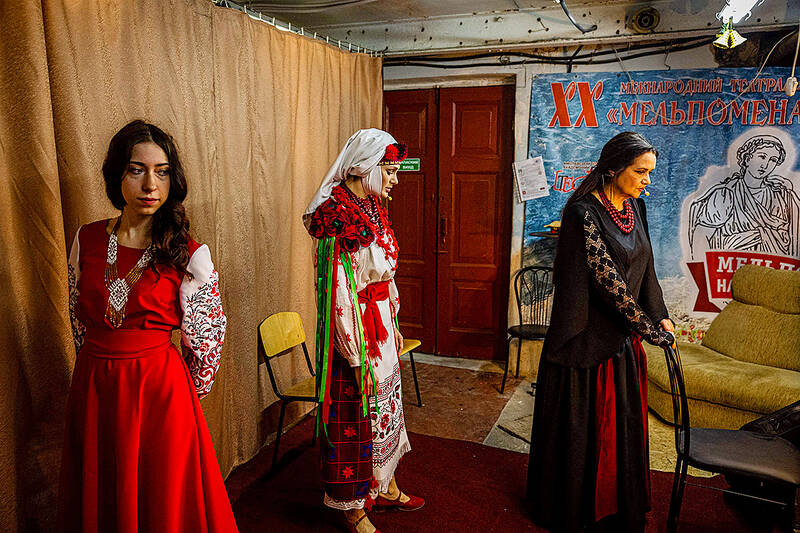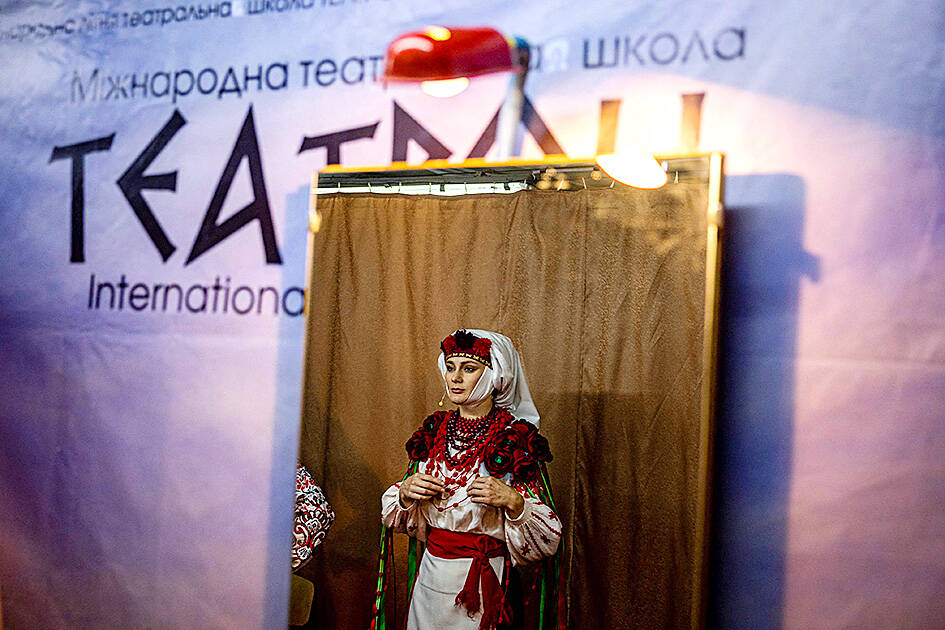It’s an opening night like no other at Mykolaiv’s theater, with the audience ushered down into an underground shelter this week for the first performance since war broke out.
“We need this place to fight on the cultural front too,” artistic director Artiom Svytsoun says.
The tiny underground stage and the minimalist set provides “a form of ‘art therapy’” for the people who have stayed in Mykolaiv and need something other than the grinding fear of war.

Photo: AFP
Welcoming audience members, giving tours of the subterranean theater and taking care of the myriad technical details, 41-year-old Svytsoun is the beating heart of the operation. He is the one who worked to get the theater reopened in the relative safety of an underground bunker.
With the help of a European aid fund, his team took two months to transform a shelter four meters below ground into the 35-seat venue, its irregular white walls covered with a fresco reminiscent of classical theaters.
The strategic port city of Mykolaiv had a population of half a million souls before Russia invaded on Feb. 24.

Photo: AFP
Now it bears the scars of the many bombardments it has endured almost daily for the past six months. Three hundred meters from the elegant neo-classical building that houses the theater stands the twisted concrete shell of the regional administration, which was hit by a missile on March 29 that killed 37 people.
NAME CHANGE
According to the local town hall, the city has enjoyed just 25 attack-free days since Feb. 24. President Volodymyr Zelensky has said that, along with Kharkiv in the north and the eastern Donbas region, Mykolaiv is the most heavily bombed city in Ukraine, despite the fact that the front line is about 20km away.

Photo: AFP
The destruction has not been limited to military targets. Three universities were recently bombed and, according to regional authorities, 123 cultural institutions have been destroyed in the region since the fighting began.
Another effect of the invasion on the Mykolaiv theatre has been a name change.
The former Mykolaiv Russian Drama Theatre is now the Mykolaiv Theatre of Dramatic Arts.

Photo: AFP
In the tiny dressing room, its walls covered with photos of Soviet, Ukrainian and Hollywood actors, Kateryna Chernolishenko, 43, receives the final touches to her stage make-up and is in a good mood.
“I’m very happy to be back on our stage, back home, and I think it’s important that art can be a support for people,” says the actress, who like her fellow thespians volunteered to take part in this premiere.
Her colleague Marina Vassyleva, who is about to don a wedding dress, adds emphatically: “Actors, in these circumstances, are the doctors of the human soul.”

Photo: AFP
“I see my mission and the meaning of my life right now. I am needed here in Mykolaiv,” she says.
MAKING LIVES EASIER
Since the start of the war, three of the theater’s actors have joined the army and another 20 percent of the troupe have taken refuge elsewhere in Ukraine, or abroad — a modest proportion in a town that has lost more than half its population, according to the town hall.
The company is used to playing in a 450-seater theater.
Now the plays are being adapted and squeezed into the “stage in the shelter,” as it is called. But despite the war, it is not just about performing patriotic works. After a curtain-raiser paying tribute to Ukraine, the first play of the new season, by a contemporary national author, is an absurdist play about “the realization of our desires”, says Svytsoun.
The bunker theater will put on two shows a day, from Thursday to Sunday, much to the delight of theatergoer Olga Kroutchok. “I hope to come back every weekend. Theater brings emotions to people in these times of war, and it makes our lives easier,” said the 55-year-old.
Fellow audience member Oleksander Skotnikov, 42, agrees. “When we are under the bombs, as we are now, the theater gives us a big smile and inspires people to keep on living.”

Growing up in a rural, religious community in western Canada, Kyle McCarthy loved hockey, but once he came out at 19, he quit, convinced being openly gay and an active player was untenable. So the 32-year-old says he is “very surprised” by the runaway success of Heated Rivalry, a Canadian-made series about the romance between two closeted gay players in a sport that has historically made gay men feel unwelcome. Ben Baby, the 43-year-old commissioner of the Toronto Gay Hockey Association (TGHA), calls the success of the show — which has catapulted its young lead actors to stardom -- “shocking,” and says

The 2018 nine-in-one local elections were a wild ride that no one saw coming. Entering that year, the Chinese Nationalist Party (KMT) was demoralized and in disarray — and fearing an existential crisis. By the end of the year, the party was riding high and swept most of the country in a landslide, including toppling the Democratic Progressive Party (DPP) in their Kaohsiung stronghold. Could something like that happen again on the DPP side in this year’s nine-in-one elections? The short answer is not exactly; the conditions were very specific. However, it does illustrate how swiftly every assumption early in an

Inside an ordinary-looking townhouse on a narrow road in central Kaohsiung, Tsai A-li (蔡阿李) raised her three children alone for 15 years. As far as the children knew, their father was away working in the US. They were kept in the dark for as long as possible by their mother, for the truth was perhaps too sad and unjust for their young minds to bear. The family home of White Terror victim Ko Chi-hua (柯旗化) is now open to the public. Admission is free and it is just a short walk from the Kaohsiung train station. Walk two blocks south along Jhongshan

Francis William White, an Englishman who late in the 1860s served as Commissioner of the Imperial Customs Service in Tainan, published the tale of a jaunt he took one winter in 1868: A visit to the interior of south Formosa (1870). White’s journey took him into the mountains, where he mused on the difficult terrain and the ease with which his little group could be ambushed in the crags and dense vegetation. At one point he stays at the house of a local near a stream on the border of indigenous territory: “Their matchlocks, which were kept in excellent order,